Tout ca change
A. L. Rowse
Fortune and Men's Eyes: The Career of J. P. Collier Dewey Ganzel (Oxford University Press £15)
J. P. Collier was probably the foremost Elizabethan and Shakespearean scholar of the Victorian age, certainly the one wh° accomplished most work, but he ended tlIt under a cloud which has never been lifted. I have always wanted to know what was what about him and what precisely he did t° bring the cloud down upon him. Now pr°- fessor Ganzel sets himself to lift it "- perhaps too strenuously and wholehearted' ly; far too much detail, it was not easY t° read or review. First things first, secondary matters se- cond — one should see the whole career, the work and its failings, in proportion- The work that Collier accomplished was simply enormous and immensely valuabl.e. It has to be seen in the perspective of ltAs time, when so many aids to scholarship alt"do getting things right did not exist as theY today. Again, Collier carried on his wor1,.151 such adverse circumstances — poverty,.0- security, the burdens of familY Ilf,,e' everybody ill around him, endless /lac'''. work. He earned his living for many years asr parliamentary reporter and theatre revIeWe for The Times and then for the Morningr Chronicle. He may have got old Elizabethan plays from for when young his family knew the circle of the Lambs, Hazlitt and Coleridge. 0.1! balance he made no money out of 111." gmih as Charles aprioLna. 01,1ob_ numerous scholarly works and spent his earnings on buying rare books all°0 manuscripts. Those were the days — vitte;i3 he could acquire 2,000 manuscript plaYs.% one lot and make any number of discoverle.: of illuminating documents, tracts, forgo,t., ten Elizabethan works, when todaY scholars are scraping the barrel. Those were the days when a Duke of Oevonshire aimed at creating the finest Private library in Britain — today being dispersed; when the Earl of Ellesmere, with 90,000 a year, was building his library at 'fldgewater House for all the manuscripts 00w at the Huntington Library in Califor- i na. Collier was given the entry to these sl?lendid collections, and made full use of his grand opportunities, discovering a um- (1,.ile manuscript of Bale's King Johan in the first and editing a volume of Egerton Papers in the second. These were but parerga compared with his History of English Dramatic Poetry, which laid the foundations for subsequent work in that field; his Memoirs of Edward 41IeYn from the collections at Dulwich, his Work on the Stationers' Register, covering Printed works from about 1540 to the Civil War. Besides this, he brought to light a cou- "e of unknown Jonson masques and numerous tracts of Heywood, Nashe etc. It was enough to make anyone envious, and scion envy began to raise its ugly head. In.addition to his own work, Collier's en- Intislasm led him to do a lot of work for Other People. He was a leading operator in f-unding and running the Percy Society, for Publishing old ballads and songs; the Shakespeare Society for plays and related 7'aterial; the Camden Society for history and historical documents. stumbled It was altogether too much. Then he — or, rather, stumbled upon a find Which brought him great success at first and
then a peck of troubles. This was a copy of the Second Folio of Shakespeare, 1632, in which a later hand had made many emenda- tions, a few useful, most of them valueless. This led to great excitement; Collier himself was over-excited by it, with his enthusiastic temperament, and rushed a one-volume popular Shakespeare edition into print, adopting many of those emendations when he should have been more cautious — though others adopted them too.
Then the fat was in the fire. Odium theologicum, it has been said, is nothing compared to odium archaeologicum. All Collier's jealous rivals and enemies popped up their heads; controversy raged for decades and made Collier's life miserable, though it did not stop him from producing. The Victorian rage for controversy is hardly understandable today — we have more serious things to think about. What does it matter whether Shakespeare wrote `uptrim- med' or 'untrimmed'? Of course we want to get the text of Shakespeare as authentic and intelligible as we can, but one should have a sense of proportion in these matters.
The controversy that raged around Col- lier was almost comparable to those around Darwin and evolution, or Bishop Colenso and Biblical Criticism. Anything about the Bible or William Shakespeare tends to render people dotty. Hardly a week passes but I get a letter from some fool asking me whether Shakespeare wrote his own plays or telling me that he didn't. The explana- tion is quite simple: though one is not sup-
posed to say it in these democratic days, most people do not know how to think, strictly speaking, and do not qualify to hold any opinion on an intellectual matter.
The real trouble is that `the experts' were not much better. One of Collier's op- ponents was fixed on the idea that The Tempest was an early play, when it is the penultimate one, and that the island in question was Lampedusa when in fact the play was sparked off by the wreck of the Sea Venture on Bermuda in 1609.
Collier incurred the envenomed hatred of the powerful Sir Frederick Madden at the British Museum, who is the villain of Pro- fessor Ganzel's book — he has written it like a detective thriller, and I don't much care for detective thrillers. I suspect that Madden was a better pure scholar than Col- lier, and he too did a mass of good work. Why couldn't they all love each other and help each other out? Poor Collier was unlucky: think what another opponent — a good Shakespearean scholar too — got away with. J. 0. Halliwell stole books from Trinity College Library, Cambridge and sold them to the British Museum; he then stole the heiress of the great bibliophile, Sir Thomas Phillips, and ended up as Halliwell-Phillips with half a million. His rare books have been sold away from the Morrab Library in Penzance in the ruin of our time.
Did Collier tamper with the manuscripts he studied, both in the Perkins Folio and at Dulwich? Professor Ganzel completely ex- onerates him, and goes so far as to suggest that Madden himself may have been the culprit in the former. I rather doubt that, but he certainly emerges a rather dis- ingenuous character, a not very nice man; Collier appears the more attractive, rather pathetic, more sinned against than sinning. I give Professor Ganzel good marks for thoroughness, and for his perceptive reading of Collier's character from a late photograph; a 'disconcerting picture; at first it might seem to reflect good- humoured satisfaction with a life well lived and a talent well spent; but on second glance the subject loses its air of com- posure, its decorum seems counterfeit and the gentle demeanour of the old man seems to mask a bitter imagination'. That about sums it up.
I am myself an arrant, perhaps errant compromiser, and have always refrained from using Collier's work because of the cloud overhanging it and him. Professor Ganzel has done well to remove the cloud from the man. We must remember the dif- ficult conditions in which a lot of that early Victorian scholarly work was done, lack of reference books etc and the immense amount of work Collier accomplished. He was a good man, not at all a bad one, not even mean and disingenuous like Madden; and we owe him a great debt.
















































 Previous page
Previous page